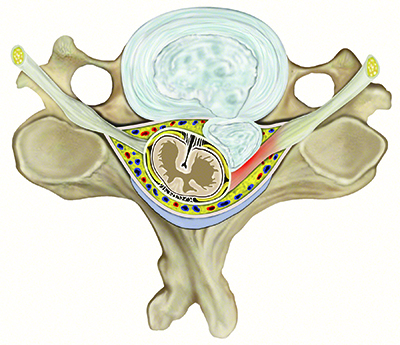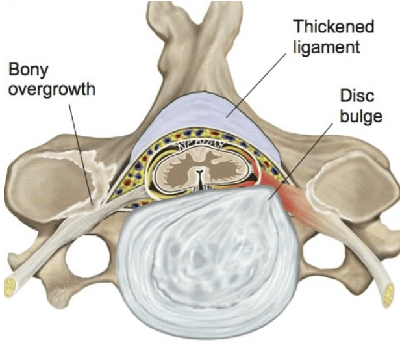Cervical Disc Bulge
The most common reason for irritation or compression of the nerve is a disc bulge. When a disc bulges, the slightly softer centre of the disc (nucleus) can bulge through the fibrous outer layers (annulus). Sometimes the softer disc material can leak out. When a disc bulges, your body tries to repair the bulge. It sends in lots of cells that reabsorb and repair the bulging disc. Your body is very good at repairing the bulging (sometimes called slipped) disc. If the nerve root is compressed on its way out of the canal, in the exit hole (foramen) this causes arm pain, pins and needles and numbness. In the vast majority of people who develop arm pain from the compressed nerve in the neck, it improves within 3 months.

Physiotherapy often helps resolve early symptoms. While the body reabsorbs the disc there is an active inflammatory response around the nerve and disc. The ‘inflammatory chemical soup’ that is surrounding the nerve irritates it and can also cause pain down the arm. The nerve may also be irritated if there is compression caused by the bulging disc. Your spinal specialist may consider referring you for Cervical Foraminal Injection or Anterior Discectomy and Fusion if time and physiotherapy do not help.
Cervical Stenosis and Cervical Myelopathy
Our joints, ligaments and discs wear as part of the normal age related process. Most of the time this does not cause significant symptoms. If, however the spinal facet joints become enlarged and worn, alongside buckling of the ligament at the back of the canal, this can reduce space where the nerves sit. When the nerve peels away from the spinal cord and becomes a nerve root, it exits the spinal canal in a hole called the foramen. If this nerve root is compressed in the exit hole, then it will cause arm pain along the distribution of the nerve down the arm.

Your spinal specialist may consider referring you for a Cervical Foraminal Injection or Anterior Cervical Discectomy and Fusion.
The spinal canal itself can also become narrowed due to these wear changes, narrowing the space where the spinal cord is sitting. This narrowing can become more significant if combined with a bulging disc, which narrows the front of the spinal canal. A combination of wear at the disc, ligament and joint can significantly compress the spinal cord as in runs through the canal. This narrowing is called spinal canal stenosis. If there is enough narrowing to cause pressure on your spinal cord, then the cord can become swollen. This is called cervical myelopathy.
Cervical myelopathy, when the spinal cord in the neck is compressed and swollen, causes a specific set of symptoms. You may experience tingling or numbness in the arms below the elbows into the hands. You may also experience tingling or numbness in the lower part of your legs, below the knees into your feet. Typically, but not always these symptoms affect both sides. You may also experience other symptoms such as unsteadiness with walking, or reduced co-ordination of your hands. In rare cases your bladder and bowel control can be effected or you could lose the use of your legs. If you develop any of these symptoms you need to seek an urgent medical opinion via your GP, who can refer you on to a specialist spinal service, such as New Hall. Surgery for Cervical Myelopathy, compression and swelling of the cord, does not always reverse symptoms that have already developed. It can prevent damage to the spinal cord from getting worse and causing more severe symptoms, therefore it is important to get a medical opinion when symptoms first develop.
Your spinal specialist may consider referring you for Posterior Cervical Decompression or Anterior Cervical Discectomy and Fusion or Cervical Corpectomy.





